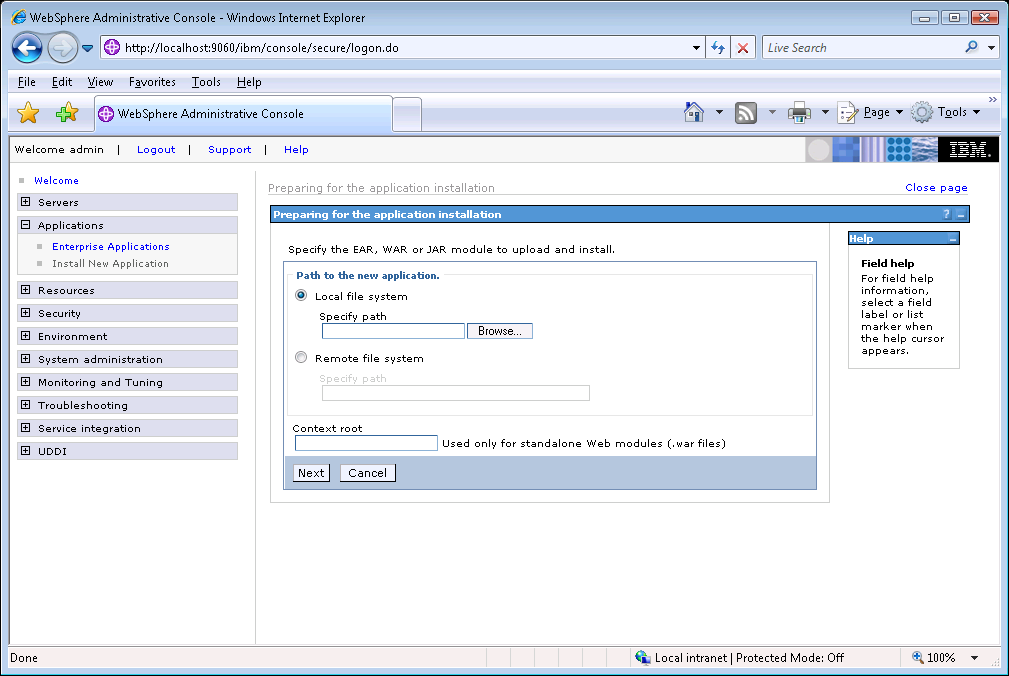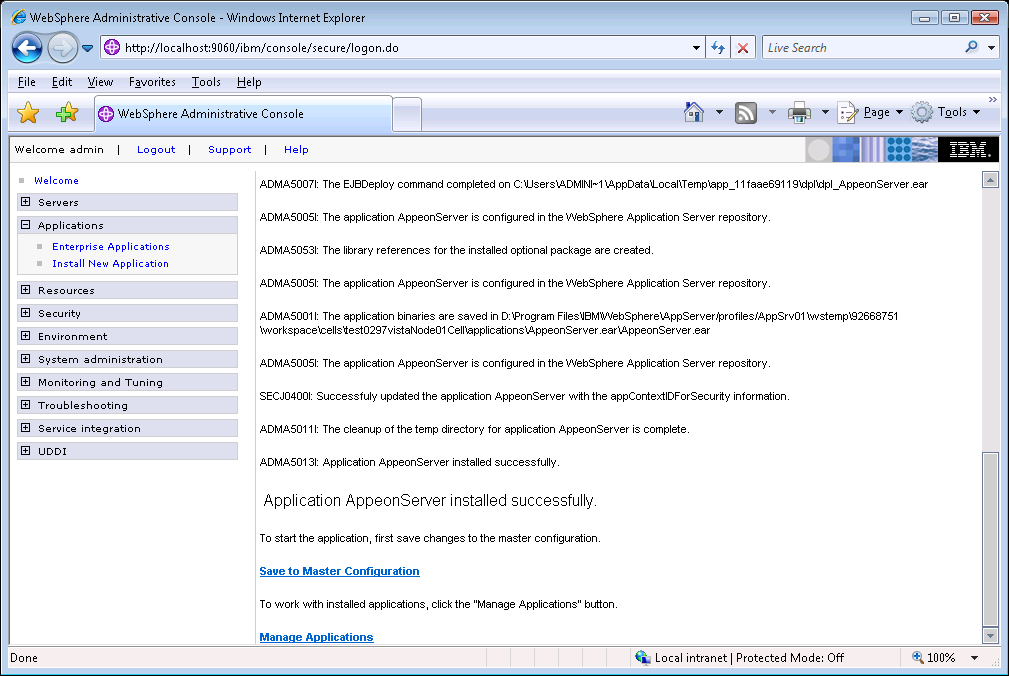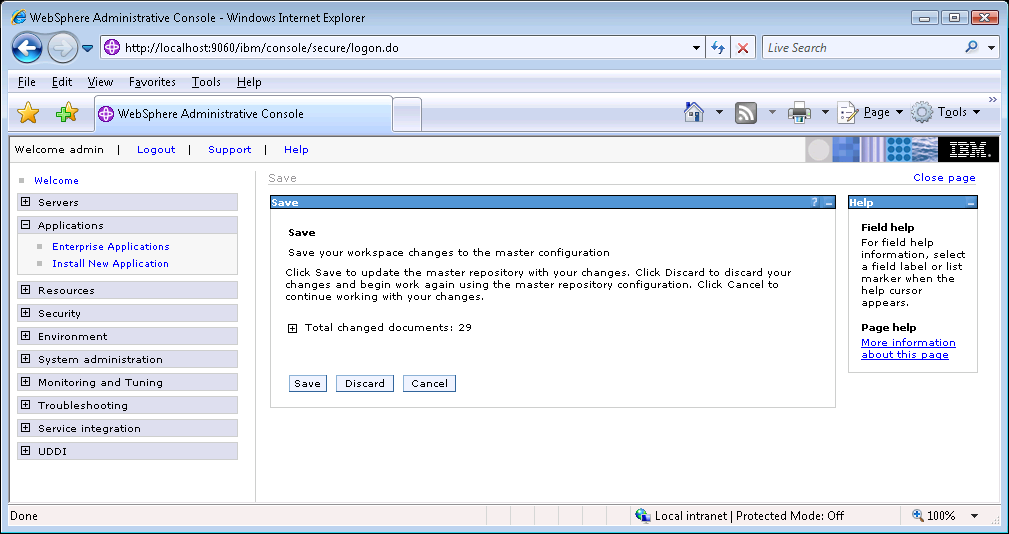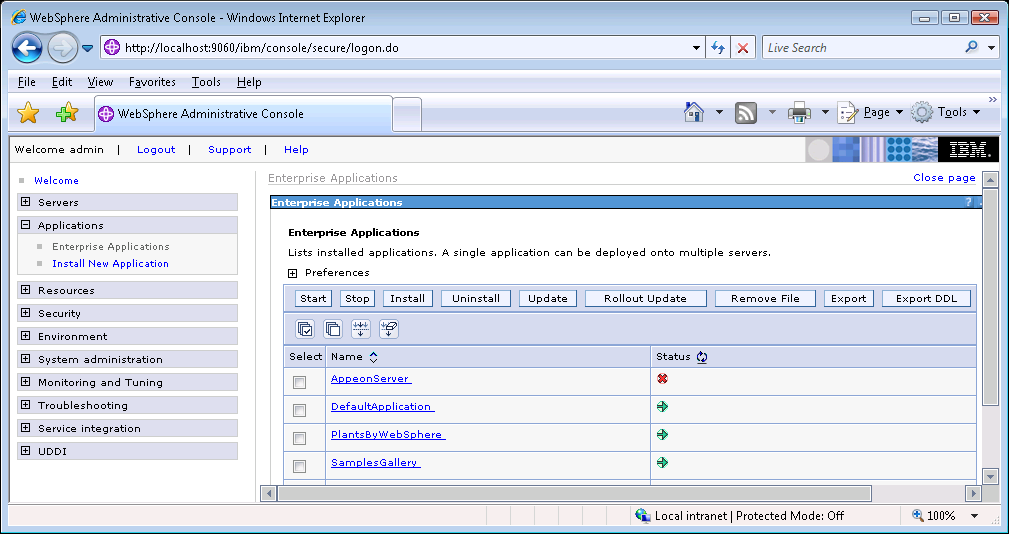To install PowerServer on the Unix\Linux platform, you will go through the same installation process as that used for the Windows platform. The only difference is, with the Unix\Linux platform, you will complete the installation process in command line mode, instead of using graphical user interfaces.
Step 1: Verify that WebSphere Application Server, as well as any other programs you may be running, is stopped.
Step 2: Open the Appeon4WebSphere folder from the Appeon setup program and run the install.sh file using the command below:
./install.sh
Notes:
-
If you copy the Appeon setup program to the computer before installation, make sure that the directory does not contain special characters or spaces.
-
When you input the command, please be aware that file names and directory names are case sensitive.
The welcome message is displayed, which indicates that the installation process has started. Follow the step-by-step prompts to install PowerServer.
Step 3: Press Enter or input Next to proceed.
Step 1. Welcome Message ------------------------- ################################################################# Welcome to PowerServer 2017 for WebSphere installation! ################################################################# Press Enter to start the installation [Exit][Next]>
You can also input n, N, next or Next to indicate Next, p, P, previous, or Previous to indicate Previous, and e, E, exit or Exit to indicate Exit. Notice that the input is case sensitive.
Step 4: Specify a JDK 1.6 or above to be used during the setup progress. The setup program will check whether the JAVA_HOME variable exists and whether it points to a valid JDK 1.6 or above. If it is valid, the JDK path will be automatically displayed as below; if it is not valid, please set a valid JDK 1.6 or above location.
Step 2. Set JDK 1.6 or above path ----------------------- JDK path is "/home/jdk1.6.0_17" Press Enter to continue [Exit][Next]>
Step 5: According to the license you purchase, select the Product Type.
Step 3. Please choose Product Type ################################################################# 1. PowerServer Web 2. PowerServer Mobile 3. PowerServer Web and PowerServer Mobile 4. PowerServer Web & Mobile Please select a number to continue OR [Exit][Previous][Next]>
Step 6: Enter the Product Key that is shipped with the product.
Step 4. Product Key for PowerServer Web & Mobile ------------------------- ################################################################# The format of the product key provided by Appeon should be XXXX-XXXX -XXXX-XXXX-XXXX-XXXX-XXXX. All characters should be capitalized. ################################################################# Please input the product key or [Exit][Previous]>
Step 7: Specify the home directory of the WebSphere Application Server as the PowerServer Mobile/Web installation directory, for example, /opt/IBM/WebSphere/AppServer or /opt/IBM/WebSphere/AppServerCommunityEdition.
Step 5. Install Directory ------------------------- Please Input the directory you want to install the PowerServer 2017. (e.g. ../IBM/WebSphere/AppServer) or [Exit][Previous]> The PowerServer 2017 will be installed in /opt/IBM/WebSphere/AppServer
Step 8: Confirm the setup settings.
Step 6. Confirm Information
-------------------------
#################################################################
Confirm the installation
The product type is "PowerServer Web & Mobile"
The product key for PowerServer Web & Mobile is "XXXX-XXXX-XXXX-XXXX-XXXX-XXXX-XXXX"
The installation directory is "/home/AppServer/IBM/WebSphere/AppServer"
AEM Console:
Username: admin
Password: admin
The installer will start installing the files on your system.
Go back if you want to change any settings for the installation.
#################################################################
Please select an option to continue[Exit][Previous][Next]>
Press Enter to begin copying the required files or input p or Previous to modify the setup settings.
Step 9: When the installation is complete, choose whether to start PowerServer.
################################################################# Congratulations! The installation has been successfully completed. ################################################################# Start PowerServer ------------------------------ Do you want to start the PowerServer now? [Yes|No]>
To start PowerServer immediately input y. To start it later input n. Refer to Starting/Stopping PowerServer for how to manually start PowerServer using commands.
After installing PowerServer to the WebSphere Application Server home directory, you must deploy the PowerServer EAR package (appeonserver.ear) manually, via the WebSphere Application Server Administrative Console.
Follow the instructions below to deploy the appeonserver.ear package to WebSphere Application Server (taking WebSphere AS 7.0 as an example).
Step 1: Start WebSphere Application Server. Open the $WAS_HOME/bin/ folder and run the startServer.sh file. For details on starting WebSphere Application Server, refer to Starting/Stopping PowerServer.
Step 2: Access WebSphere Application Server Administrative Console. Input http://localhost:9080/admin in the Web browser address bar on the local machine. The WebSphere Login window will appear.
Step 3: Log in to the WebSphere console with the appropriate user ID.
Step 4: Expand the Applications node and click Install New Application in the left pane.
Step 5: Click the Browse button on the Preparing for the application installation window that appears in the right pane and select the appeonserver.ear package installed to the home directory of the WebSphere Application Server.
If the appeonserver.ear package is not installed on the local machine, select Server path and specify the location for appeonserver.ear.
Step 6: Follow the prompts and click Next. It is safe to use the default settings.
During this process, you may encounter "Application Security Warnings" from WebSphere. You can simply disregard these warnings, because the appeonserver.ear application requires no security settings to be set on WebSphere.
Step 7: Click Finish to complete the installation.
Check to make sure that the installation was successful.
The name used to identify the application (appeonserver.ear) is AppeonServer by default.
Step 8: Click the Save to Master Configuration link.
Step 9: Click the Save button to save the new installation to the master configuration.
Step 10: Restart the WebSphere server to enable new configurations.
Step 11: Ensure that the newly installed application: AppeonServer (the default application name for appeonserver.ear), is started.
Expand the Application node and click Enterprise Applications in the left pane. AppeonServer is listed as an installed application in the table in the right pane.
-
Check to make sure that AppeonServer has successfully started (
 ).
).
-
If the initial status of AppeonServer is "stopped" (
 ), select AppeonServer by checking the appropriate box on
the left and click the Start button
to start it.
), select AppeonServer by checking the appropriate box on
the left and click the Start button
to start it.
AppeonServer will start automatically when WebSphere Application Server is started.
Step 12: Launch AEM to further verify that the PowerServer EAR Package is successfully deployed.
Enter the following URL in the Web browser address bar: http://host:port/AEM, for example, http://localhost:9080/AEM. If the AEM logon window can be opened, the PowerServer EAR package is deployed correctly and is ready for use.







